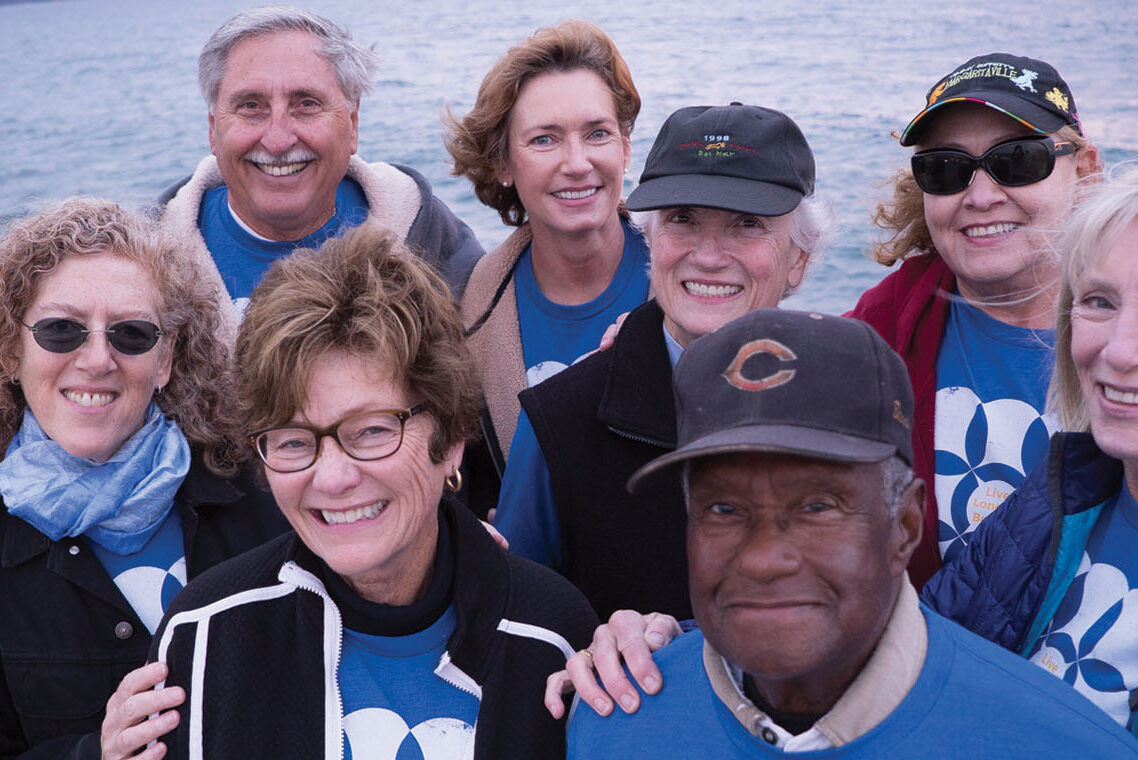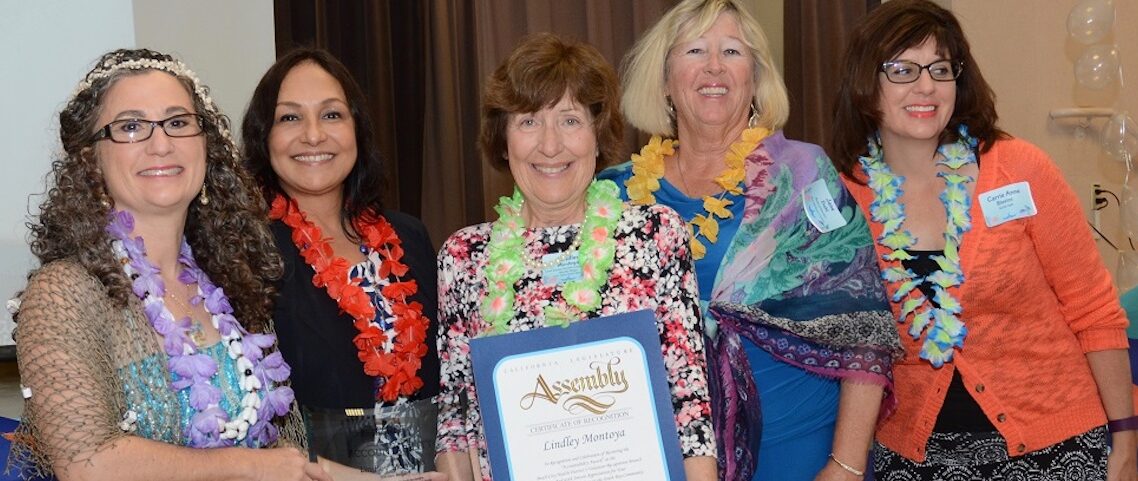South Bay native Rick Rasnick, once one of the most promising young coaches in college football, is now struggling with the debilitating effects of early-onset Alzheimer’s disease.
When you meet Rick Rasnick, 58, the first thing you notice is his imposing stature – the former star football player and division I head coach stands at an athletic 6 feet, 3 inches tall. Your eyes are then drawn to his contagious smile, good looks, tanned Southern California skin and strong hairline.
At first glance, you’d never imagine Rick is nearing the final stage of his life – bouncing in and out of lucidity, barely able to muster much more than confused mumblings. You’d never notice he’s desperately grappling with early-onset Alzheimer’s, a rare, incurable and deadly disease that is systematically chipping away at the very gift that once propelled him to be one of the youngest coaches in college football history: his mind.
How can someone so physically fit become so mentally feeble? It’s a tragic trademark of the uncommon disease: early-onset affects people under age 65, accounts for just five percent of all Alzheimer’s cases worldwide and all this still confounds Rick’s family to this day.
“He was like a God to me when we were growing up,” said Ryan Rasnick, 50, who now helps his parents and Rick’s girlfriend, Annette Adams, provide care for his older brother. “So, it’s really hard to see him like this, difficult for all of us to process. Especially if you knew Rick before.”
Football: A Family Tradition
Jim and Donna Rasnick know the way to San Jose. Almost too well.
Following storied high school careers at North High in Torrance, both of their sons starred as football players for San Jose State University. Rick was a team captain and center on the offensive line (1981-82) and later Ryan (1985-88) was a hard-hitting member of the defensive secondary.
“Sports was always the family business and we travelled to all of our kids’ games,” said Donna, whose daughter Kendahl was also a noted athlete and cheerleader. “But San Jose became our home away from home in the ‘80s.”
Following graduation in 1982, Rick was asked to join the Spartan’s coaching staff as a graduate assistant by legendary coach Jack Elway, father of NFL Hall-of-Famer John Elway. According to Ryan, his older brother’s maturity, work ethic and mental acuity made him an ideal coaching candidate, even at a young age.
“Rick was actually a pretty undersized guy on the offensive line, so he always had to outthink guys, outwit them, outwork them on the field,” he said. “He loved competing and there was no doubt in any of our minds that he was destined to be a coach someday.”
“It was his dream from a really young age,” added Donna. “And it didn’t take long to see he was really good at it.”
Rick’s analytical approach combined with his innate ability to relate and connect with players triggered his meteoric rise through the coaching ranks. After just four years on staff, he was named the offensive coordinator at his alma mater, making him the youngest division I coordinator in the country at just 27 years of age.
“Coach Raz was so cerebral, a really deep thinker who always gave thoughtful answers to our questions,” said James Carter, an All-American offensive lineman who Rick recruited to San Jose State in 1984. “I developed a bond with him immediately. He was tenacious, personable and only five years older than me. He was my kind of guy.”
With Rick calling the plays, the Spartans offense was one of the most potent in college football, ranking fifth nationally in points per game in his first year. The Spartans finished the ‘87 season with a remarkable10-2 record.
In ‘91, Rick was named the offensive coordinator for the University of Utah, where he quickly transformed one of the nation’s more ham-fisted offenses into one of the most effective, launching them from 23 points per game to a gaudy 36 per contest in just four years.
His success didn’t go unnoticed. In ‘95, Rick was introduced as the new head coach at Eastern Michigan University, where he helped groom future NFL quarterback Charlie Batch, but enjoyed limited success during a five-year stretch that ended in his firing.
The following year, Rick turned down an offer to become the offensive line coach for the Detroit Lions to instead move his family back to the West Coast, spend more time with his two young sons, Blair and Pierce, and attempt to repair his failing marriage. His efforts to save the relationship were unsuccessful. To stay close to his boys, he accepted a job for an insurance company in Los Altos, where he used his recruiting and training expertise to ascend the corporate ranks.
“That was a tough time for Rick,” his mother remembers. “He lost his marriage and the career he really loved.”
Something Just Wasn’t Right
Ryan remembers it like it was yesterday.
“It was Super Bowl weekend and my mom called me at 8 o’clock at night to tell me that I was going with my dad to Los Altos in the morning to bring my brother back home,” he recalls. “I was so confused, had no idea why or what was going on. But I went.
“We got to Rick’s house, and I’d never seen him like that before. He was slower mentally and just not how I remembered my brother being at all. It was hard to understand, but we brought him home and hoped for the best.”
News of Rick’s return to the South Bay spread quickly and it wasn’t long before coaching inquiries began pouring in from local high schools and community colleges. But, strangely, Rick was having a difficult time impressing interviewers.
“He was forgetting things, stats, strategies and such, and his personality was changing,” Donna said. “It was very unlike Rick to be so absent-minded, or to struggle to find a job for that matter. Looking back, we all knew something wasn’t right, but every health professional or psychologist who examined Rick attributed the changes to the divorce and recent career turmoil. We were told it was just a temporary mental breakdown. We were all pretty oblivious.”
Things seemed to be looking up for Rick when he met his girlfriend, Annette, in 2013. She recalls immediately being drawn to his sense of humor and down-to-earth personality.
But she too began to notice oddities as their relationship progressed. There was the time Rick called her to ask how to work the TV remote control. Or the time he forgot how to use his iPhone. Or the day he arrived five hours early to pick her up from the airport.
“At first you think these are just miscommunications,” explained Annette, who now lives with Rick in Redondo Beach. “In the moment, it’s very difficult to identify the root cause of the forgetfulness or slight personality changes, but things became much clearer when I spoke to Donna about Rick’s recent issues and began accompanying him to doctors’ appointments.”
The Diagnosis
Rick and his family got the difficult news in 2014. He was stricken with a very rare and aggressive form of Alzheimer’s disease known as early-onset, which expresses its deadly symptoms like impaired memory and speech, issues with problem solving and changes in mood or personality in otherwise healthy adults under age 65. The prognosis is bleak for those diagnosed with the disease; the average life expectancy is just five to seven years and there is no cure.
According to Dr. Dean Sherzai, M.D., the former director of Alzheimer’s Prevention at Cedars-Sinai, football-induced brain trauma is the likely culprit behind Rick’s condition.
“The repeated pounding that a center takes during the course of a game is extremely detrimental to the brain,” said Dr. Sherzai, who has worked with numerous NFL players during his medical career. “Repetitive head trauma will cause what’s known as Chronic Traumatic Encephalopathy (CTE), which can exacerbate an underlying propensity for dementia and cause it to activate at an early age.”
Had Donna and her husband been aware of the dangers of the sport, she’s adamant that neither of her boys would have been allowed to play.
“Oh, not a chance,” she said, shaking her head. “Baseball or basketball, yes, but certainly not football. But we didn’t know the risks 30 to 40 years ago. Didn’t have a clue about CTE.”
At the time of his diagnosis, Annette and Rick had only been dating for little more than a year, which led to a difficult, but necessary, conversation between Donna and Annette about the future.
“She (Donna) called me and said, if I choose to walk away, she wouldn’t think badly of me,” recalled Annette, wiping away tears. “I said, ‘but he needs help, and if I walk away, who’s going to be there for him?’ So, I stayed.”
“She (Annette) has been an angel for him,” said Rick’s father, Jim. “An absolute angel.”
A Difficult Path Forward
As is the case with early-onset Alzheimer’s patients, Rick’s condition has deteriorated rapidly.
“The last year has been especially rough,” said Donna, who at age 77 helps Annette provide daily care to her son. “He’s gone downhill really rapidly, and we all know what is ahead. It won’t be long until he forgets how to swallow and eventually breath; it’s not a pretty picture.”
Today, Rick struggles to communicate or process verbal cues, showing fleeting sparks of coherence. It isn’t uncommon for him to get lost in his own home, unable to navigate from the upstairs to downstairs, or wander away in public places. He relies on his mother and girlfriend to help him with his daily routine and personal care.
“He requires 24-hour assistance and supervision,” said Annette. “It’s physically exhausting and an emotional struggle some days, but he needs the help.”
According to the family, one bright spot is Rick’s weekly trips to the Center for Health & Fitness, a community fitness center operated by Beach Cities Health District, to exercise with his trainer Derick Malit. The pair have been working out together for nearly a year to help preserve Rick’s physical condition and, hopefully, give him a fighting chance against the degenerative condition.
Donna noted that it was extremely challenging to find a place for Rick to not only exercise, but also connect socially with people. “We had looked at a variety of places, but they couldn’t give him what he really needs,” she said. “There aren’t many resources available for someone his age with his condition. Fortunately, the health district was recommended to us by a friend, and we found Derick.”
“Rick just lights up around him (Derick),” added Jim. “It’s unbelievable to watch them together; Derick is so patient, so consistent with him, and Rick leaves the Center for Health & Fitness so energized and alive. It’s a beautiful thing to see.”
During their training sessions, Derick slowly re-teaches Rick how to exercise in tiny increments by showing him the motions required for each exercise. More often than not, his instructions are forgotten within seconds.
“I’ve found him to be much more responsive to exercise demonstrations,” explained Derick. “I get his attention by asking him a question about himself, like his name, and then go right into an exercise demo. This triggers him to follow my movements, and many times, he will impulsively transition into other exercises. His muscle memory is still sharp as a tack from his years of athletic training, which is amazing … It didn’t take long to realize I’m training an absolute stud.”
To keep morale high, Derick offers a constant stream of encouragement and audible cheers – even playfully asking Rick to show off his dance moves in between exercises.
“Man, he loves to dance,” laughed Derick. “All I have to do is ask and he’ll immediately respond with one of his silky-smooth moves. It’s another great trigger I use to transition him into different exercises, and we both have a lot of fun doing it.”
Though Rick has been robbed of the ability to lead men on the gridiron by an incurable condition that, inevitably, will strip him of his life, the former coach is still managing to inspire those around him.
“When I’m working with Rick, I often find myself teary eyed – not from sadness or pity for his condition, but from overwhelming feelings of pride and respect for what he’s accomplishing,” said his trainer. “He may not realize it, but he motivates me and a lot of other people to keep working hard, fighting and moving forward regardless of the challenges that lie ahead.”
One of those people is former NFL player and current New York Jets offensive line coach Dave Diaz Infante, who played for Rick at San Jose State.
“He’s a really special person,” said Infante, who credits Rick with helping launch his career. “A natural born leader who always outworked and outhustled his opponent, regardless of the score, so it’s no surprise to me that he’s taking that same approach with his illness. Coach Raz is resilient; he’s tough; and he never goes down without a fight.”
Writer’s Aside:
During the time I spent with the family, here is one of the things I found most compelling.
When Rick looks into mirrors, he doesn’t recognize the man staring back at him. Seeing his reflection confuses and fascinates him. He looks, points, chuckles and even attempts to engage in conversation with himself.
However, he has no problem recognizing his parents, brother and, especially, his girlfriend, Annette. At one point during the interview, I was moved to see Rick gently pull Annette in for a hug and give her a gentle kiss on the forehead. His emotional connection and love for her was compelling to see, and as I learned from Rick’s dad, Jim, something you definitely don’t want to cross …
“Rick sure loves her, boy, let me tell you,” Jim told me with a very telling chuckle. “I found that out firsthand when I tried to dance with Annette at an event the other weekend. I went to cut in and he let his old man know loud and clear that wasn’t going to happen. There’s not a man alive that could have pried her from his arms that night.”






